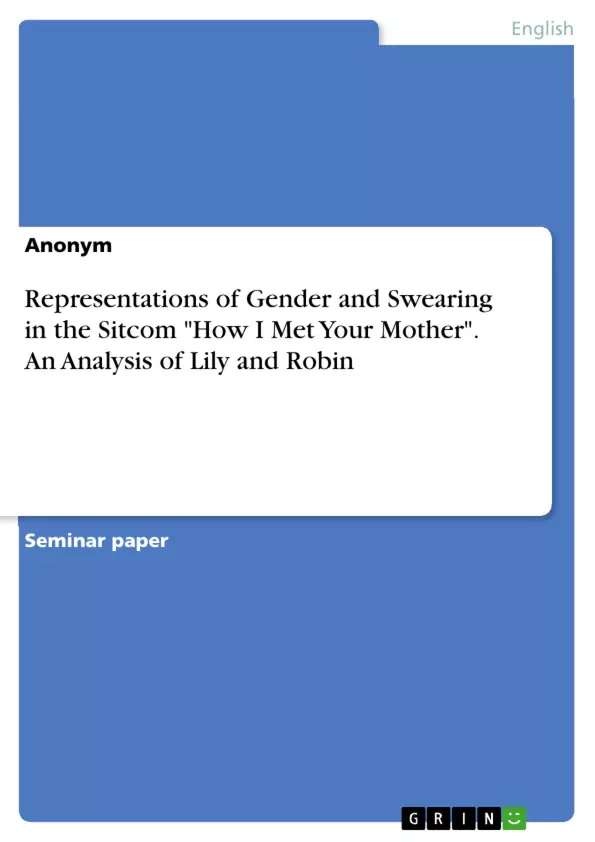This paper will explore the thesis that the female characters of the sitcom "How I Met Your Mother" challenge the dominant ideologies of gender which imply women’s natural subordination to men by means of swearing and conversational humour. To begin with, swearing is going to be defined and different types of swearing will be characterized. Afterwards, the interpersonal functions of swearing will be explained which are closely related to the domain of humour. Thus, the relation of swearing and conversational humour will be investegated as well as the interpersonal functions of humour. Next, the focus is going to shift to gender differences of swearing and conversational humour.
In the chapters that follow, an in-depth analysis of gender and swearing in "How I Met Your Mother" will be provided. First, this paper is going to give a short outline of the sitcom and explains the choice of data and methods. Next, the focus is on the character Lily Aldrin in terms of her social role as a caring wife and kindergarten teacher by examining her use of swear words. Finally, the paper analyzes the character Robin Scherbatsky who struggles to find her identity by trying to combine her work life as a journalist with her love life. Accordingly, her dissatisfaction becomes particularly evident in her usage of swear words which challenges dominant ideologies of gender.
Inequality between the sexes has been deeply embedded in most cultures and societies, where women firmly belonged to the domestic sphere and had to perform their duties as housewives and mothers. This social division based on gender still emerges in today’s societies and is both reflected and created in patterns of language use. Feminists argue that women are expected to avoid expressions of strong feelings, directness, unmitigated statements and swearing in order to be accepted in society. Furthermore, the asymmetrical application of terms of address for women and men even creates and sustains societal
inequality. However, in the past century a major shift in perspective and a change of women’s role in society took place.
Feminist movements arose which fought for women’s independence and paved the way towards gender equality. Permeable gender identities have been created which challenged dominant ideologies of women’s speech. Especially humour in sitcoms repeatedly refers to the same stereotypes which serves to disrupt the idea of gender-appropriate behaviour through, for example, swearing.
Inhaltsverzeichnis (Table of Contents)
- Introduction.
- Defining Swearing
- Types of Swearing
- Interpersonal Functions of Swearing
- Swearing and Conversational Humour
- Gender Differences of Swearing and Conversational Humour
- Language and Gender Ideologies
- Gender, Swearing and Conversational Humour
- Challenging Gender Ideologies of Swearing and Humour
- The Sitcom How I Met Your Mother
- Short Outline
- Data and Methods
- Analysis of Gender and Swearing in How I Met Your Mother
- Lily Aldrin
- Robin Scherbatsky
- Conclusion.
Zielsetzung und Themenschwerpunkte (Objectives and Key Themes)
This paper explores the thesis that the female characters of the sitcom How I Met Your Mother challenge the dominant ideologies of gender which imply women's natural subordination to men by means of swearing and conversational humour. This is achieved through analyzing the use of swearing by two of the female characters, Lily Aldrin and Robin Scherbatsky. The paper aims to demonstrate how their swearing challenges traditional expectations surrounding women's language and behavior.
- Defining and categorizing different types of swearing.
- Exploring the interpersonal functions of swearing, especially in relation to humour.
- Investigating the relationship between gender, swearing and conversational humour.
- Examining how female characters in the sitcom challenge traditional gender ideologies through their use of swearing.
- Analyzing the significance of swear words in expressing emotions and reinforcing social bonds.
Zusammenfassung der Kapitel (Chapter Summaries)
- Introduction: This chapter provides a brief overview of the topic and introduces the thesis. It discusses how the sitcom "How I Met Your Mother" challenges conventional gender ideologies. The chapter then outlines the paper's structure, explaining the steps taken to explore the thesis.
- Defining Swearing: This chapter defines swearing and analyzes different types, including expletives, abusive swearing, humorous swearing, and auxiliaries. It also addresses the historical evolution of swearing and its perception in society.
- Interpersonal Functions of Swearing: This chapter explores the range of interpersonal functions that swearing serves, from expressing emotions to fostering social relationships. It discusses how swearing can be used to intensify emotional communication and establish solidarity within groups.
- Gender Differences of Swearing and Conversational Humour: This chapter examines how gender ideologies influence language use. It considers various approaches to gender differences in language, including the deficit, dominance, difference, and performing gender approaches.
- The Sitcom How I Met Your Mother: This chapter provides a brief overview of the sitcom "How I Met Your Mother" and explains the author's choice of data and methods. It sets the stage for the analysis of gender and swearing within the sitcom.
- Analysis of Gender and Swearing in How I Met Your Mother: This chapter focuses on two female characters, Lily Aldrin and Robin Scherbatsky. It examines how their use of swear words challenges dominant gender ideologies.
Schlüsselwörter (Keywords)
This paper focuses on the sociolinguistic phenomenon of swearing, specifically its use by women in the sitcom "How I Met Your Mother". Key themes include gender ideologies, conversational humour, interpersonal functions of language, and the relationship between language and social identity. It explores how swearing can be used to challenge traditional gender norms and express individuality.
- Quote paper
- Anonym (Author), 2021, Representations of Gender and Swearing in the Sitcom "How I Met Your Mother". An Analysis of Lily and Robin, Munich, GRIN Verlag, https://www.grin.com/document/1453710



